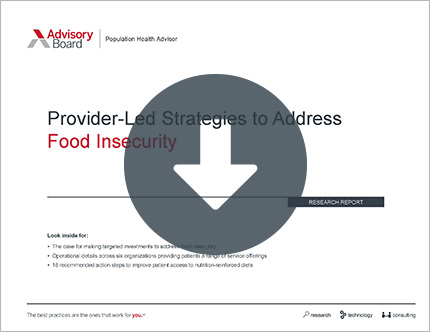Auto logout in seconds.
Continue LogoutEditor's note: This popular story from the Daily Briefing's archives was republished on May 8, 2019.
Read Advisory Board's take: How to overcome 3 barriers preventing bariatric surgery growth.
Even though obesity has increased sharply in the United States in the last 40 years, treatment options remain sparse, Gina Kolata reports for the New York Times.
Currently, about 40% of Americans are classified as obese—up from about 15% in 1975.
"Everyone—from doctors to drug companies, from public health officials to overweight people themselves—would love to see a cure" for obesity, which Kolata defines a cure as "a treatment that brings weight to normal and keeps it there."
But despite extensive research, there's only one nearly "uniformly effective treatment," Kolata writes: bariatric surgery.
Why bariatric surgery, although effective, hasn't been a panacea
Bariatric surgery, although a major procedure with significant side effects, is undeniably effective: Most patients who receive the surgery lose weight and keep it off and see improvements in their overall health. "Many with diabetes no longer need insulin. Cholesterol and blood pressure levels tend to fall. Sleep apnea disappears. Backs, hips and knees stop aching," Kolata writes.
But, only 1% of the 24 million Americans who are eligible for the procedure actually get the surgery, Kolata writes.
According to Randy Seeley, director of the nutrition research center at the University of Michigan, one reason is a shortage of surgeons. But another, perhaps more significant, reason is Americans' mindset: "[M]any patients and doctors persist in thinking—all evidence to the contrary—that if overweight people really set their minds to it, they could get thin and stay thin," Kolata writes.
Losing weight is hard enough, but a half-century of evidence proves that staying thin is even harder. A study conducted 50 years ago by Jules Hirsch, a clinical researcher for Rockefeller University, showed that patients who stayed at a hospital and stuck to a 600-calorie-a-day diet were able to lose an average of 100 pounds—but they regained that weight shortly after leaving the hospital.
After repeating the study several times, Hirsch, who is now at Columbia University, and researcher Rudy Leibel were met with the same result. "Eventually, they found that when a very fat person diets down to a normal weight, he or she physiologically comes to resemble a starving person, craving food with an avidity that is hard to imagine," Kolata writes.
Why? A major factor is a molecule called leptin. Fat cells secrete the molecule to tell the brain when the body is supposedly "too thin." In response, the brain signals the person to eat by making them feel hungry.
"In fat people, that controller is set too high: [T]heir brains make sure they stay fat," Kolata explains.
Amgen, a drugmaker, purchased the rights to leptin from the researcher who discovered it hopes of developing a drug that could treat, and possibly cure, obesity. But ultimately, the treatment "fizzled," Kolata writes.
Why it's so hard to 'cure' obesity
Part of what makes obesity so difficult to treat, according to Kolata, is that the system that controls our weight is too complex to be controlled by one type of treatment.
"I think of eating as a survival mechanism," said John Amatruda, who was an executive at Bayer and Merck when the company was trying to develop weight-loss drugs. "You need to eat, so our bodies are wired to have complex systems that are redundant."
In fact, the reason bariatric surgery is successful is because it targets numerous parts of the complex system, including the "body’s orchestra of hormones and signals, among them leptin but also many others," Kolata writes.
But because of the limited uptake and significant side effects of bariatric surgery, researchers are still trying to create a drug that can offer "the benefits of bariatric surgery without the surgery," Kolata writes.
Seeley currently performs experiments on mice and rats to better understand the way the operation affects the body's biochemistry. "We think we have good clues, but nothing is far enough along," he said.
In the meantime, researchers encourage patients and doctors alike to acknowledge that losing weight is complicated. "This idea that people should eat less and exercise more—if only it were so simple," said Kevin Hall, senior investigator at the National Institute of Diabetes and Digestive and Kidney Diseases (Kolata, New York Times, 11/19).
Advisory Board's take

Sarah Musco, Senior Consultant, Service Line Strategy Advisor
As the New York Times article points out, despite clear evidence that the surgery can help eligible patients, hospitals face significant challenges in growing bariatric surgery volumes. Prospective patients tend to underestimate their obesity, and very few of those eligible choose weight loss surgery as a solution. As a result, less than 1% of eligible patients get weight loss surgery.
To tap into bariatric surgery growth, planners and marketers need to mitigate the barriers that prevent patients from seeking surgery. Here are the three most common barriers to surgery, and how you can overcome them.
Barrier 1: Providers fail to reinforce surgery as a weight loss option
There's a growing recognition that weight loss surgery can be beneficial: Julia Belluz of Vox recently called it "medicine's best and most underused tool" to combat obesity. Even still, bariatric surgery enjoys less of a presence in consumers' mind than diet, exercise, or weight loss supplements. This is due in part to a failure of clinicians to present weight loss surgery as a viable option: Surveys show that, of individuals who meet the criteria for bariatric surgery and have recently interacted with the health care system, only 12% were told they were eligible for the surgery by a doctor.
Counter-measure: Ensure your practitioners understand patient eligibility criteria for surgery and are prepared to present it as an option, if appropriate. Developing an easy-to-use decision aid may help the conversation.
Barrier 2: Patients perceive surgery as dangerous
A third of patients believe bariatric surgery is unsafe, and 37% of Americans surveyed believe weight loss surgery is more dangerous than living with their current weight.
Counter-measures: Use marketing to link untreated obesity to the associated comorbidities that can accompany it, such as joint pain and diabetes, to more concretely illustrate the risks of avoiding treatment. In these messages, assure prospects on the safety of the procedure by highlighting the low rate of 30-day serious complications (between 0.25% and 1.25%) for the most popular bariatric surgeries: gastric banding, sleeve gastrectomies, and gastric bypass.
Or, like Valley Health in Virginia, consider facilitating in-person educational seminars to support prospective patients' weight loss goals, educating attendees on surgical options as they move toward the procedure.
Barrier 3: The high cost of surgery dissuades interested patients
Our consumer surveys have revealed that cost is the most important factor dictating a consumer's decision to seek surgical services (it's a stronger decision driver than travel time or following a referral). Of patients who have considered bariatric surgery but do not follow through, 40% said the main reason for not receiving surgery was the cost—likely due to a national shift toward high-deductible health plans and the fact that some states mandate only limited coverage for bariatric surgery.
Counter-measure: If patients in your market are especially price-sensitive, consider offering financial counseling or payment plans. Also, consider offering direct-to-consumer bundles to attract shoppers based on cost. Bon Secours Mary Immaculate Hospital, for example, offers a direct-to-consumer bariatric surgery bundle that includes pre-op, surgery, inpatient stay, and one to two post-op visits. The bundle works to attract out-of-market patients and grows the share of wallet in the bariatric surgery episode. These bundles can be crafted to a variety of purchasers—including consumers and medical tourists, but also to regional employers and health plans.
To learn more about market trends in general surgery—including the four forces changing the surgery landscape—make sure you download our general surgery market trends slide decks.
Don't miss out on the latest Advisory Board insights
Create your free account to access 1 resource, including the latest research and webinars.
Want access without creating an account?
You have 1 free members-only resource remaining this month.
1 free members-only resources remaining
1 free members-only resources remaining
You've reached your limit of free insights
Become a member to access all of Advisory Board's resources, events, and experts
Never miss out on the latest innovative health care content tailored to you.
Benefits include:
You've reached your limit of free insights
Become a member to access all of Advisory Board's resources, events, and experts
Never miss out on the latest innovative health care content tailored to you.
Benefits include:
This content is available through your Curated Research partnership with Advisory Board. Click on ‘view this resource’ to read the full piece
Email ask@advisory.com to learn more
Click on ‘Become a Member’ to learn about the benefits of a Full-Access partnership with Advisory Board
Never miss out on the latest innovative health care content tailored to you.
Benefits Include:
This is for members only. Learn more.
Click on ‘Become a Member’ to learn about the benefits of a Full-Access partnership with Advisory Board
Never miss out on the latest innovative health care content tailored to you.

